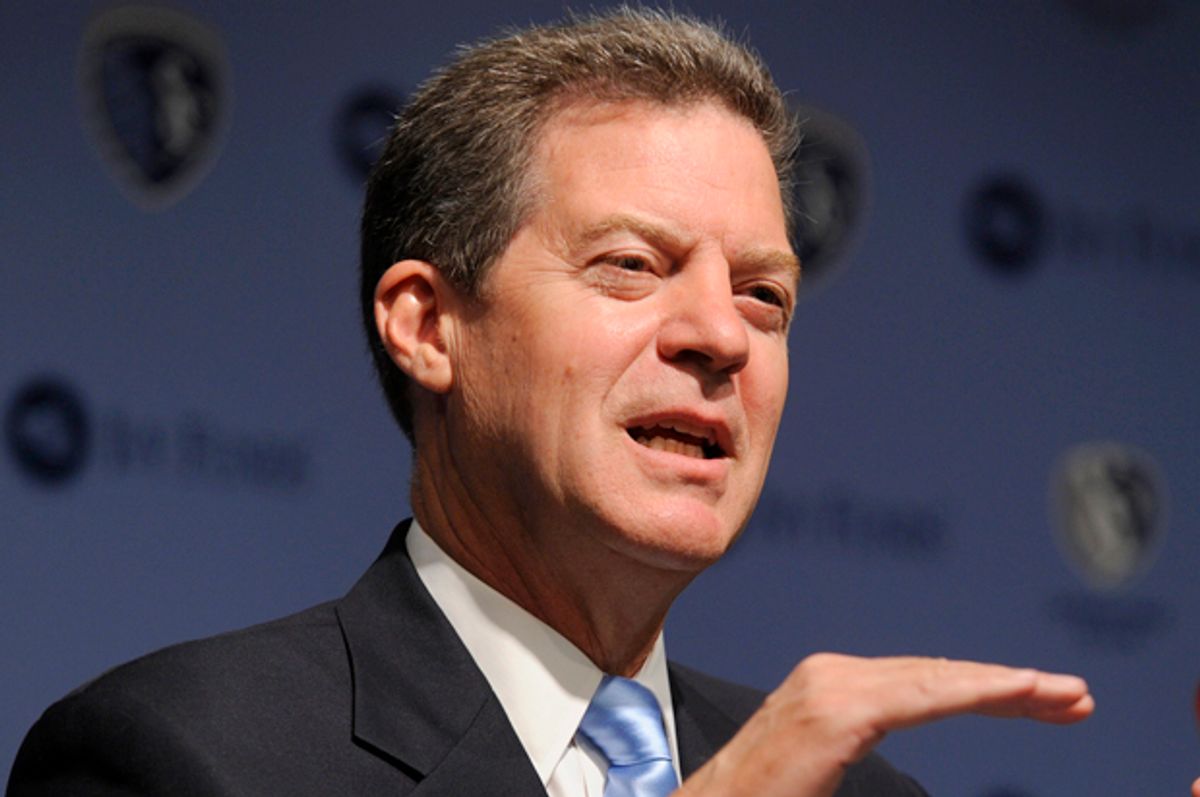On a night in which deep-blue Maryland elected a Republican governor, North Carolina Sen. Kay Hagan lost reelection despite a consistent polling lead over a flawed GOP opponent, and Democrats sustained crushing losses in House districts Republicans had no business winning, the reelection of a conservative Republican governor in rock-ribbed Republican Kansas hardly counts as Tuesday’s most surprising outcome.
Still, Sam Brownback’s 4-point victory over Democratic challenger Paul Davis confounded many national political observers. Brownback’s massive tax cuts for the wealthy, after all, have generated huge revenue shortfalls, leading Standard & Poor’s to downgrade the state’s credit rating and prompting drastic cuts in education funding. Amid a voter backlash to Brownback’s supply-side economic experiment, Davis built a healthy polling lead over the incumbent, raising hopes that five years after Gov. Kathleen Sebelius left the state to become secretary of Health and Human Services, the Kansas Democratic Party would witness a renaissance.
By the dog days of summer, polls showed Davis with a lead in the mid-to-high single digits. Few expected him to win by that much – not in a state like Kansas, and not in a year like this one – but his success in rallying the Democratic troops and winning over moderate Republicans suggested that Davis had found the winning formula that Sebelius mastered in 2002 and 2006.
But something changed in September.
Just after Labor Day, Chad Taylor, the Democratic nominee to take on three-term U.S. Sen. Pat Roberts, dropped out of the race, paving the way for head-to-head contest between Roberts and independent Greg Orman. Surveys indicated that Orman would beat Roberts in a two-man race, and polls conducted after Taylor withdrew confirmed that Roberts was in the fight of his political life. At the time, it looked like a loss in Kansas could dash the GOP’s hopes of retaking the U.S. Senate.
Roberts, whose campaign was nothing if not sclerotic in the immediate aftermath of his GOP primary victory over Tea Partyer Milton Wolf, woke up to the threat Orman posed and waged a vigorous fightback. He fired his septuagenarian campaign manager, a longtime friend, and brought in Chris LaCivita, a brash national GOP operative. Conservative big guns – Ted Cruz, Tom Coburn, Sarah Palin, Rand Paul – descended on the Sunflower State to save the GOP stalwart. Roberts and his allies blitzed Orman with tens of million of dollars' worth of attack ads.
What does this have to do with why Brownback won? A great deal, actually. While Democrats initially cheered the prospect of knocking off a Republican senator in Kansas – Kansas! – the suddenly competitive Senate race raised the midterm stakes in Kansas, where the election became as much of a nationalized affair as it was a referendum on Brownback’s policies.
Burdett Loomis, a professor of political science at the University of Kansas, told Salon that Roberts’ demonization of Orman as a liberal foot soldier for President Barack Obama and Senate Majority Leader Harry Reid nationalized the race and “had a carryover effect on GOP voters, who became more partisan in their voting, even as Brownback’s economic ‘experiment’ was viewed negatively by the electorate in exit polls.”
"Roberts' sponsors focused solely on the GOP half of the electorate,” Loomis explained. “There was no reaching out to the middle at all. And they succeeded in defining Orman, but more importantly, to me, activating GOP voters, who all in all, were not very enthusiastic about either Pat Roberts or Sam Brownback.
“Kansas Republicans are taking way too much credit for a clever campaign,” he added. “And Kansas Democrats are beating themselves up too much over a race in which they did well – Davis improved upon the 2012 Obama results by more than any other Democratic gubernatorial or Senate candidate. This was not a brilliant [GOP] campaign, this was overwhelming bombardment."
For Kansas Democrats, the inability to defeat Brownback despite the disastrous consequences of his economic policies has set off much soul-searching. If we can’t win under these conditions, many are asking, can we ever hope to revive the party? It’s an understandable question. But despite initial hopes, Kansas simply could not insulate itself from a dreadful national climate this year – and Davis still came within 4 points of defeating the governor. A loss is a loss, but that’s no small accomplishment.



Shares